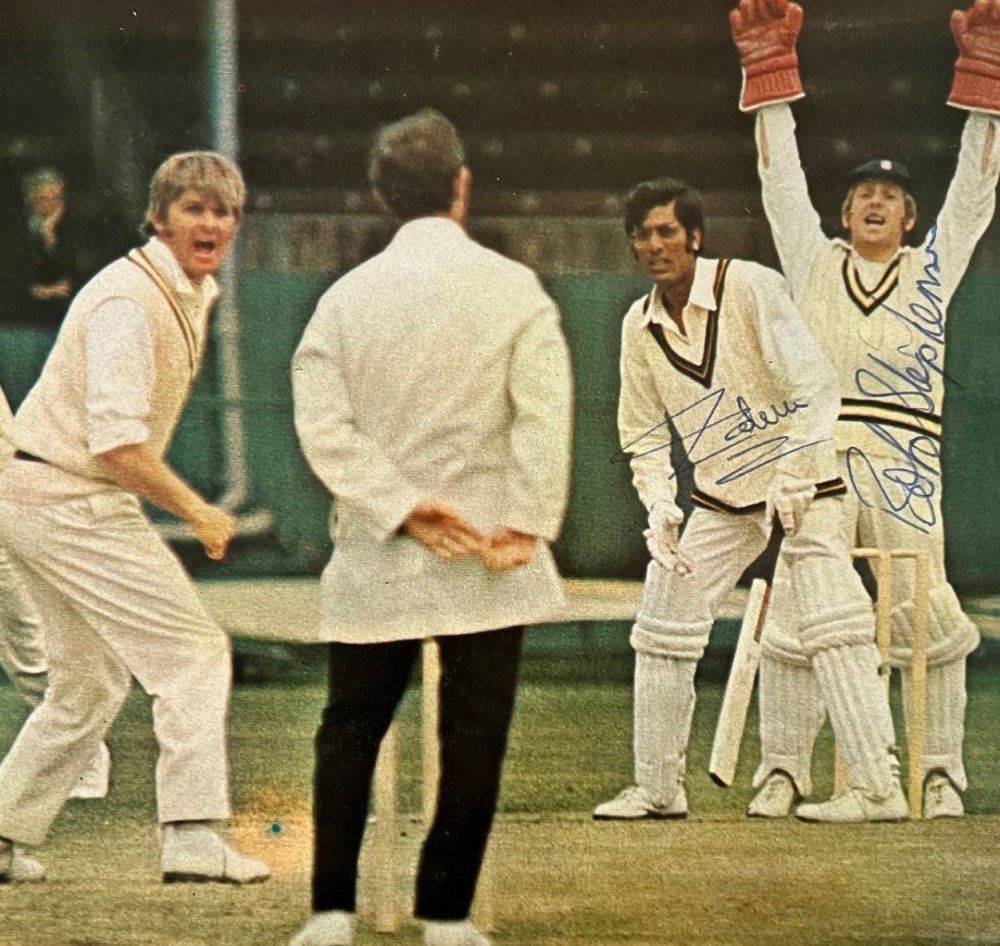I also want to lead Pakistan in Australia,” ZAHEER ABBAS tells HARESH MUNWANI in an exclusive interview in Bombay on September 21, 1983.
As a captain, Zaheer Abbas is an unknown quantity. It is as a batsman that he has adorned the pages of cricket’s history book. The 36-year-old bespectacled cricketer before embarking on the tour of India has scored more runs in Test cricket than any other Pakistan cricketer—4073 runs, which include eleven tons in 58 Tests for an average of 46.81.
The 5′ 11″ Zaheer Abbas has scored 105 first class hundreds, only the twentieth batsman, the fourth youngest, and the third non-English man to achieve this honor. However, compared to his predecessors, Zaheer lacks the glamour of Imran Khan and the showmanship of Javed Miandad.
SPORTSWORLD: Let us start with your book Zed, which has been released recently. The portion that deals with your relationship with Javed Miandad is bound to raise eyebrows. Despite your status in world cricket, on the tour of Australia in 1981-82 you claim that as vice-captain you were treated like a “naughty schoolboy” by Javed Miandad, who was the captain. Further, he never accorded to you the respect a senior cricketer commands in the team and that Javed preferred the company of the younger players at the risk of alienating the seniors. Don’t you think this revelation will strain your relations with Miandad on the Indian tour, considering that you need him as he is your second-best batsman? After all, soon after the Australian tour, Miandad had to step down from captaincy in the face of a revolt from senior players. Any comment?
ZAHEER ABBAS: Well, for once, whatever I have said in the book is 100 percent truth. It’s all fact, no one can deny that. There was no way I could have left these episodes out of my autobiography and pretend that they never occurred. I don’t think Javed quite appreciated the fact that I could not take the field, because I had been hit by a thunderbolt Jeff Thomson delivery in my rib cage, which made it difficult to stand, let alone run around. Miandad was more taken up by the idea of a captain setting a personal example. Here I was for an ordinary four-day game—not a Test match, mind you—being subjected to an inquisition for the most humiliating experience of your life. As for strained relations with Javed, let me state emphatically that both sides have forgotten past events. We sincerely feel that what’s over is over. At the moment, Javed and I get along very well. He has assured me of his full cooperation as a professional, and I have every reason to believe him because Miandad is essentially a team man. We are like brothers in every sense of the word, and two brothers don’t have the occasional squabble.
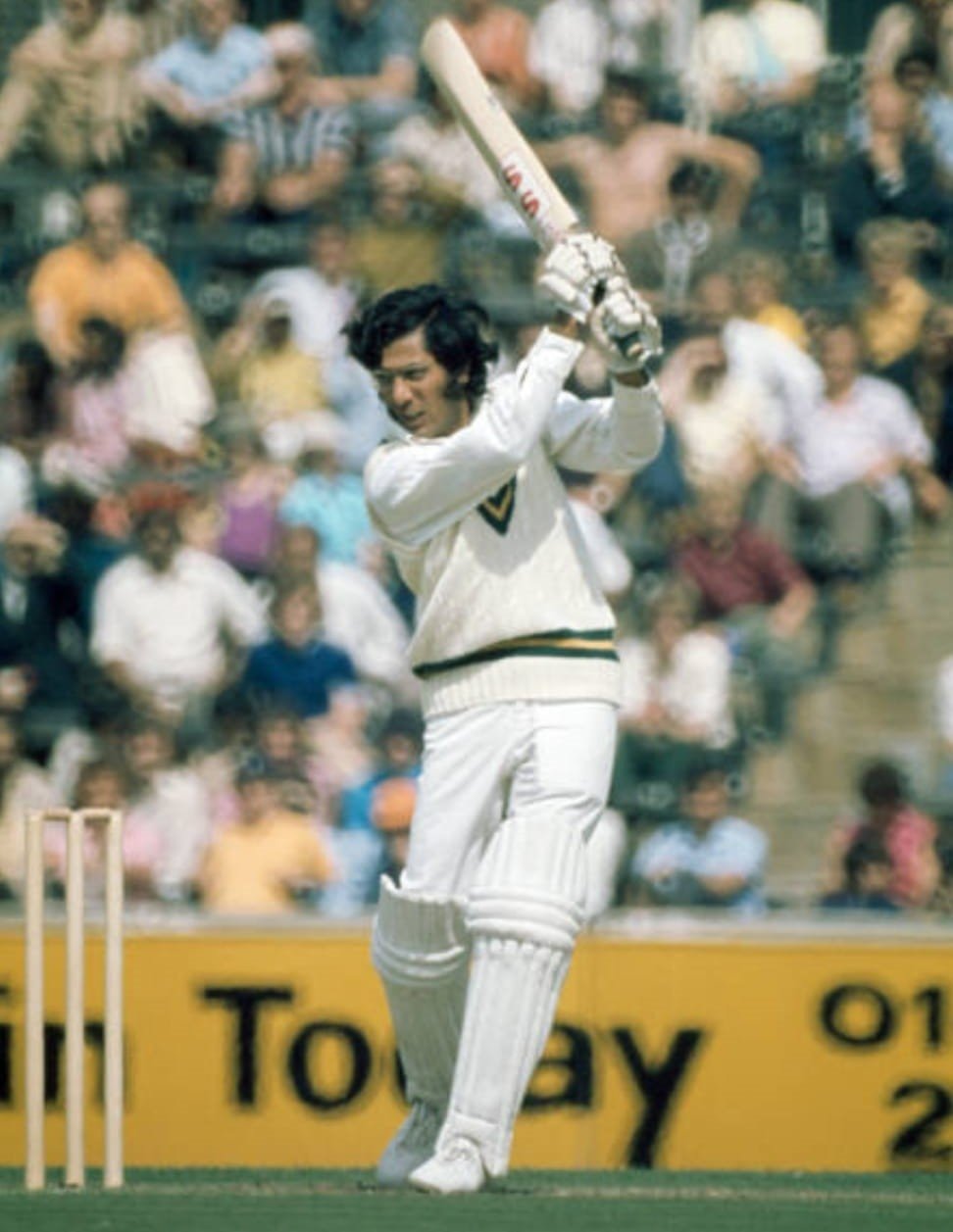
SW: You also say that before going to Australia on that tour you had informed the board that you would like to bat at number 4, instead of number 3 which was agreed to, and yet on the tour Down Under you were forced to bat one down. Was it because Miandad himself wanted to bat at number 4?
ZAHEER ABBAS: In the first place, I had said number 4 or 5. David Foot, who did my autobiography, probably misunderstood and just mentioned number 4. The reason I wanted to go lower down the batting order was because for eleven years I had batted at number 3, and since unfortunately Pakistan rarely got a good opening start, I was at the wicket shortly after the innings commenced. The strain, discomfort, and uneasiness were beginning to tell on me. Moreover, I felt I could perform better down the order. Since Miandad was firmly entrenched at number 4 and he is an exciting bat, I didn’t want to disturb him and was willing to bat at number 5. Now that I have switched to number 5 I am more successful, as the score books will tell you. If someone wants a change and proves that he is more useful in his new slot than in the previous one, nobody should point fingers at him. For example, if a working man decides to go into business and earns more money in the process, isn’t he justifying the change?
SW: But you confess that the 1981-82 tour to Australia was the unhappiest tour of your life. What about the 1979-80 tour of India, You couldn’t be having too many happy memories of that either.
ZAHEER ABBAS: The tour of India where I flopped was because of a personal problem. But the tour of Australia affected all the team members, and as events later transpired, Pakistan cricket in general. Javed was making statements that were disapproving to most of us. The Lillee-Miandad incident reflected badly on the game. The psychological anxieties, and the injury caused by the Jeff Thomson delivery, the physical travel involved, and the Board’s charge that the senior players did not cooperate with the captain all contributed to making it the unhappiest tour of my career.
SW: Before coming to India, you were reported to have said that as captain you look upon the tour as a temporary assignment. Further, you would like to see Imran Khan back as captain for a tour to Australia later this year. Don’t you think the Indian tour is too short for a skipper to establish rapport with his boys and get the best out of them? Captaincy is a long-term process.
ZAHEER ABBAS: I have never said that; somebody is putting words into my mouth. I am willing to lead Pakistan in Australia. Of course, a lot will depend on what happens on the Indian tour. My performance and my leadership qualities will be on view. And if the selectors want me to take the team down under, I would be glad to oblige. It’s as you say it takes a captain some time to understand his man and vice versa for the combination to be effective.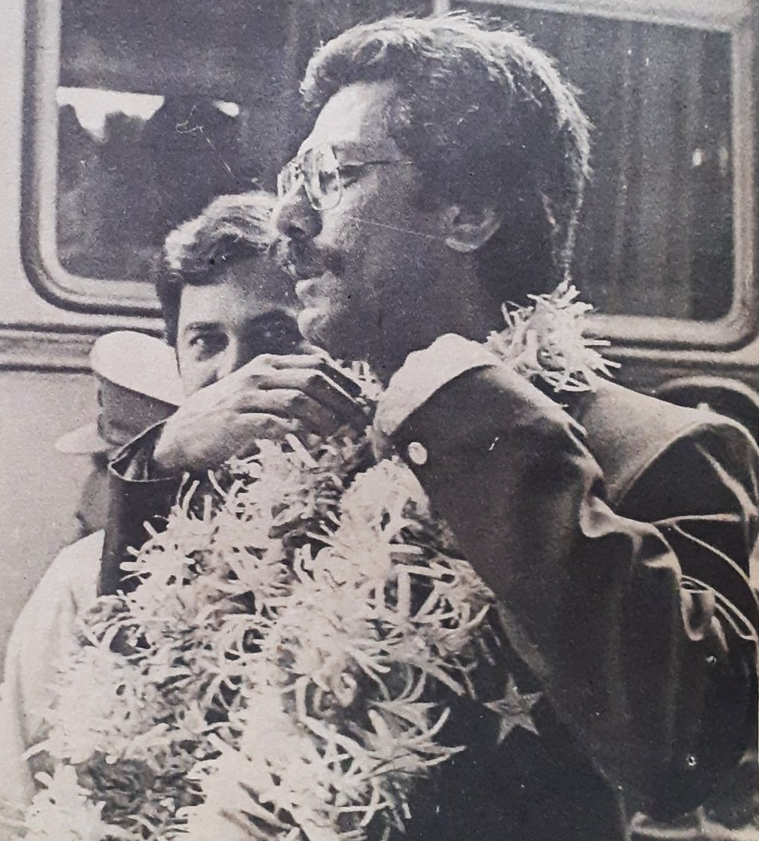
SW: Talking of captaincy, don’t you feel it’s come your way rather late? Both Javed Miandad and Imran Khan were appointed ahead of you as captains of Pakistan, despite the fact that you were senior to them. Was it because you were not trusted, or was it because you did not have much experience leading sides?
ZAHEER ABBAS: Of course, I was interested in which cricketer would not like to lead his country. It’s an honor. I was captaining the local sides in domestic cricket, and if I may add successfully, the only time I was seriously in the running for the captaincy was in 1980, immediately after Pakistan’s tour of India. But sadly, enough for me, I fared rather poorly on that series and, in fact, never played the last Test in Calcutta. Consequently, my case was a bit weakened. When we returned to Pakistan,, my detractors were shooting for me. And the impression I got, though admittedly no one said it to my face, was that my performances in India would go against my candidature. The problem had, in fact, assumed such proportions that holding my place in the side was going to be tricky. I don’t know what the question mark was against my leadership qualities. But if performance was the criteria, then I should have been named captain years ago, soon after I got the 274 in England during the 1971 tour. I am 36 now, and whether I lead for one test or 50 tests, the record books will register the fact that I captained Pakistan.
SW: In your book Zed, you feel that “this supreme honor” of leading your country probably never came your way because you are an introvert. “That I may have prejudiced my chances by not mixing more with members of my board.” Are you trying to suggest that those who were appointed captains played up to the establishment?
ZAHEER ABBAS: Here I will only speak for myself. I am not free with anybody and everybody because of my reserved nature. I much prefer to spend my non-cricketing hours with my close friends. I don’t feel I should go and tell the board members that I would like to be captain. In fact, they should know I am interested because I am leading teams in the domestic tournament. Also, I don’t believe in playing up to and forming lobbies to press my case. Others may do it; I won’t.
SW: How are you handling the pressures of captaincy?
ZAHEER ABBAS: Every few seconds, the telephone rings. The ground has to be inspected, the nets have to be arranged, and the boys have to be looked after. If anybody is injured, one has to make sure they receive treatment. Invitations to parties and functions have to be screened, and board officials have to be met. In short, a captain cannot have his private life as an individual and has got to be available at all times. As an ordinary player, you are a free bird, and you can do what you like. But a skipper has to do a lot, and honestly speaking, I am beginning to enjoy my new job.
SW: Recently, you completed 100 first-class centuries. How did you feel at the time you notched the record?
ZAHEER ABBAS: I was thrilled to say the least. Even against children, it’s not easy to score a century.
SW: Do you think on the basis of this you could be considered among the all-time greats of the, game? After all, it’s a tremendous achievement, and surely you have to go down in history for your batting prowess.
ZAHEER ABBAS: Again, that’s for others to say. All I will admit is that I have crossed a milestone, something that is not easy to achieve.
SW: You had a dispute with your county, Gloucestershire, because you played so little for them this season, due to your other commitments. They have threatened not to renew your contract. What about that?
ZAHEER ABBAS: This year if I didn’t play much for Gloucestershire, it’s because I was playing the World Cup for Pakistan. Later on, I had to return home before the English season ended because we had a training camp for the probable tour of India. The County is blowing up a non-issue. Last year, the county had losses of nearly £50,000. I was not there to assist them because I was touring England with Pakistan. This year, the county made a profit because I helped them win nine games. Secondly, Tony Brown, the Gloucester secretary, told me that the county needed a bowler more than a batsman, and since a county can have only one overseas player, they were opting for a West Indian bowler instead of renewing my contract. I was speechless. Here I had served the County for 12 years and had scored nearly 50 centuries for them and this was their way of saying thank you. It was then that I turned around and told Brown I had done my best for Gloucester, so there was no reason for me to feel guilty. I can always return to my family construction business in Pakistan in 1985.
SW: Talking of county cricket, don’t you think in recent times all the big names in Pakistan cricket have been products of the county circuit. But with this new rule restricting a country to playing not more than one overseas player, will it not affect Pakistan cricket?
ZAHEER ABBAS: Definitely. County cricket has contributed a lot to Pakistan cricket. I still maintain that the reason is simple. County cricket is much more difficult to play than Test cricket. A cricketer has to play seven days a week on the county circuit, not to mention all the travelling that goes with it, which is why a player who does well in this class of cricket will always shine in Test matches. The demands in county cricket are much more than conventional cricket.
SW: Today experts say that Zaheer Abbas is very strong on the off-side, and yet in 1971 when you got that majestic 274, no less a person than Peter May said you played most of your strokes on the leg-side. Any comment?
ZAHEER ABBAS: Look, I don’t decide where to hit the ball. That all depends on where the bowler pitches the ball. It’s not as if on a given day, I say to myself today I will play eighty percent of my shots on the off-side. No batsman can go through Test cricket relying on one particular side to make his strokes on. A lot of people say a lot of things hastily. I have learnt to ignore most of it, except maybe what the knowledgeable experts say.
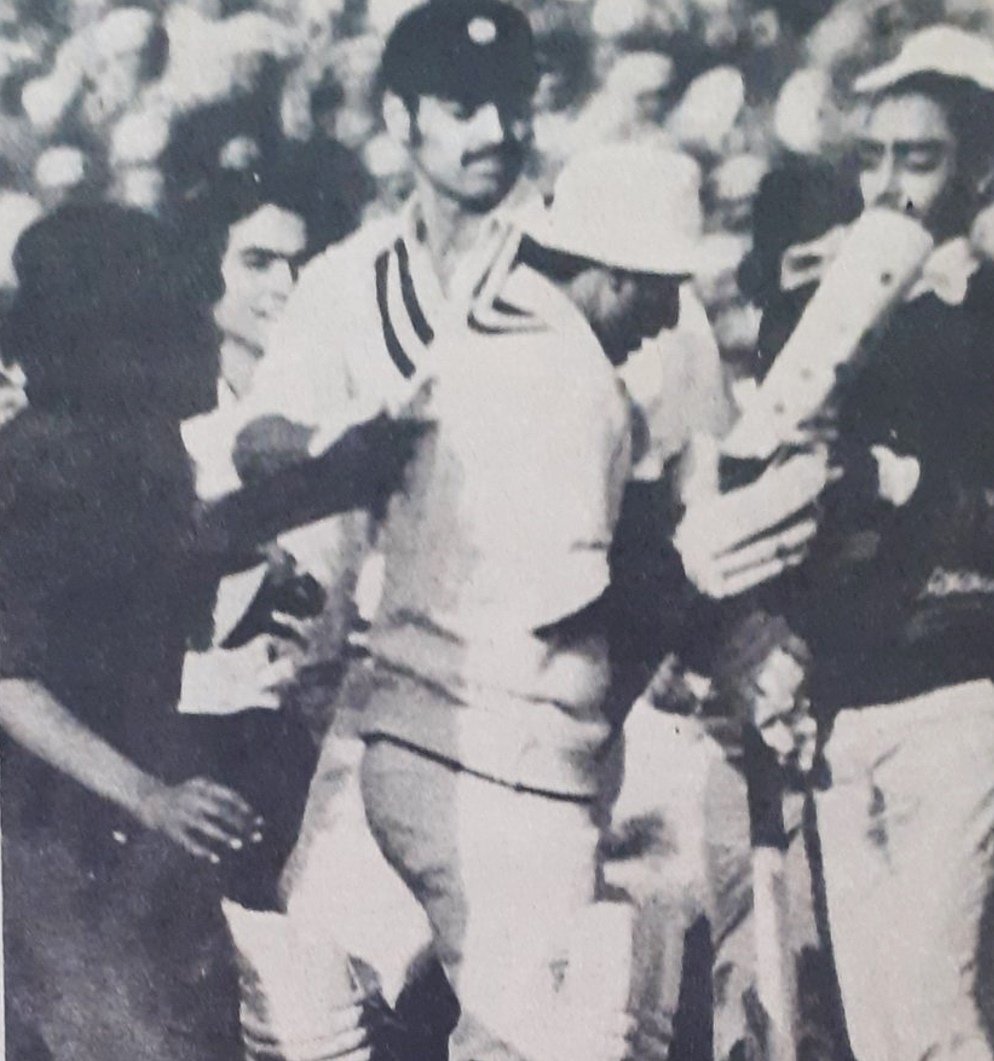
SW: As a batsman, what is more important to your technique—footwork or eyesight?
ZAHEER ABBAS: A good batsman is a combination of a lot of things. To me, eyesight and technique are important. I have virtually no footwork to speak off.
SW: When I interviewed you in 1979, you said that a complete batsman should never be beaten, and the batsman who comes closest to this description in contemporary cricket was Sunil Gavaskar. Do you still feel the same way?
ZAHEER ABBAS: In my opinion, he is still the greatest. His sheer performance makes me proud of him. Any opening batsman who can survive Test cricket for more than a decade has to be something out of the ordinary. That’s why I can understand what he is going through now. A top-class batsman sets such high standards for himself that when he fails, critics don’t spare him. But I have every reason to believe Sunil will come good and score those three centuries to pass Sir Don’s record of 29 tons.
SW: As one great batsman to another, what do you think Sunil is doing wrong these days?
ZAHEER ABBAS: Whatever the problem, a little change in technique can always overcome that. I don’t know what Gavaskar should do. That is something entirely up to him. For example, I was going through a lean patch on the last tour of India. After doing a bit of rethinking, I decided midway through the 1981-82 tour of Australia to change my technique. Instead of keeping my bat in the blockhole as the bowler runs up to the crease to deliver the ball, I hold the bat in the air. You know the way Tony Greig used to do it. I found that, as a result, I was being caught behind far less than before. Gavaskar will have to try something like that too.
SW: You mentioned Bradman’s record. Given your appetite for runs, isn’t this something up your street?
ZAHEER ABBAS: Yes (pauses). Javed Miandad, who made his debut in 1979, has already played 52 Tests, while in 13 years I have played a mere 58 Tests. In the Seventies, there were times when Pakistan did not play a single Test in a year. By comparison, Gavaskar, who came to Test cricket at about the same time as me, has played about 90 Test matches. I think I have missed the bus.
SW: In normal conversations, your sense of humor is conspicuous by its presence, and yet during interviews it is absent. What is the reason?
ZAHEER ABBAS: The reason is I am scared of being misquoted. The number of times what I have said has been interpreted quite differently is not funny. I guess experience has taught me to restrain myself in public. Immediately after the Indian tour of Pakistan, Imran said he was not going to be available for the visit to India in 1983. The next thing I knew, a Pakistani paper said Zaheer had also made himself unavailable.’ Believe me, I had not said a single word on this subject.
SW: How much do you think you will miss Imran on the current tour? Considering that in the last series it was the phenomenal swing that Imran Khan achieved at a great speed that caused the Indian debacle. Also, would Sarfraz and Qadir be missed?
ZAHEER ABBAS: Yes, Imran Khan means so much to Pakistan. He is a great bowler and a tremendous asset. Surely, we shall miss the experience and variety Sarfraz Nawaz and Abdul Qadir would have lent to the attack. But it can’t be helped. However, I am confident that our present set of bowlers are capable of bowling India out twice. Rather than talk about those who are not here, I would rather talk of those who are here. It’s odd, but the Indian media has been persisting with this question regarding the absence of Imran Khan, Sarfraz Nawaz, and Abdul Qadir. For God’s sake, I wish the Indian media would mind their business. Good or bad, that is, our bowling strength, and whether we win or lose, we have to accept it because at the moment this is the best available team. Speaking for myself, I would not like to miss any Test. Simply because a Test match is a Test match. But I guess an individual has the right to decide when he wants to play.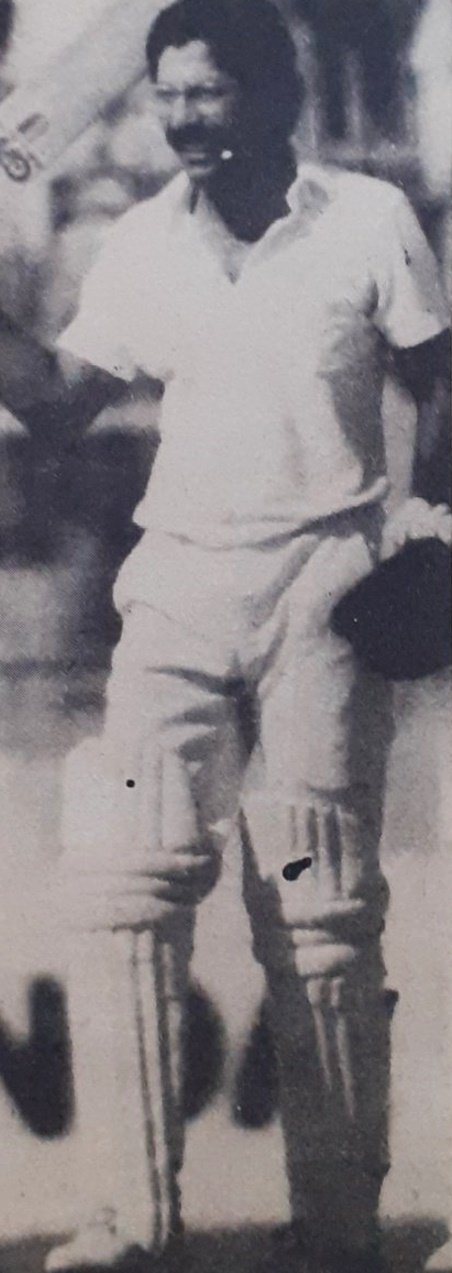
SW: How do you rate your team’s chances?
ZAHEER ABBAS: We have a balanced side. I have great hope in the youngsters. The promise and the potential they have shown in the practice matches has been particularly refreshing. I am pleased with my bowling strength. I am not going to predict anything except to say that the team will try and make as few mistakes as possible. Obviously, we will have to experiment. The favorable point, from our point of view, is that the pressure is now on us because India, after their triumph in the World Cup, are favorites, not to mention the home conditions. Secondly, we do not have the stars on the Pakistan side as we did on the last tour.
SW: But your present set of bowlers does not inspire confidence, particularly when India has batting right down to number 10. On what basis do you base your optimism?
ZAHEER ABBAS: All of them are top-class bowlers. They are young and enthusiastic.
SW: Maybe, but lacking experience in international cricket.
ZAHEER ABBAS: As a quality, experience is more vital to spinners than fast bowers. Our spinners, Iqbal Qasim and Muhammad Nazir (Junior), have the experience. As for our young fast bowlers, they have the basic requisites of accuracy, speed, and movement. These lads bowl a good line and length. Admittedly, they are not in the same league as Imran or Sarfraz, but you have got to start somewhere. And I am pretty sure one or two of them will blossom on this tour.
SW: Are you satisfied with the itinerary? In one month, you are playing three Tests, two one-day internationals, and one night game.
ZAHEER ABBAS: It is a ridiculous schedule. It’s not fair on the players. From a captain’s point of view, it reduces the chance of experimenting. At the end of the series, a captain might well regret playing a certain player instead of another. There are no three-day matches. No player can play himself into the Test side.
Related Reading: Zaheer Abbas: Joyful and Boyish
